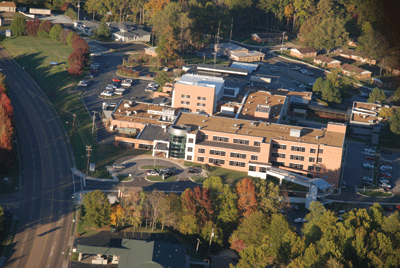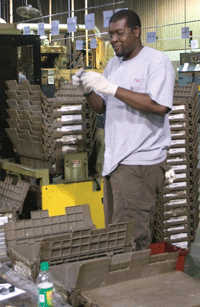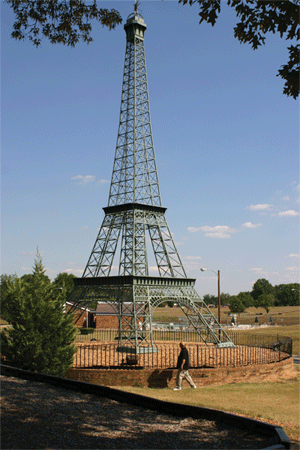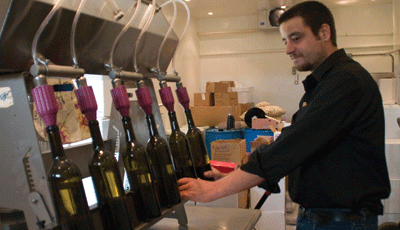Community Profile: Health Care Industry Rejuvenates Paris, Tenn.
Photo Gallery | Article
Photo Gallery

The Henry County Medical Center is the heart of the burgeoning health-care industry in Paris. The county’s decision to keep it and expand it ignited a boom in health-care services in this part of western Tennessee.

At Institutional Casework Inc., Candace Steele works a machine that sizes, glues and trims the edging of doors and drawers.

At PML Inc., Craig Moore inspects metal automotive parts after they’ve been coated with adhesive.

A 60-foot replica of the Eiffel Tower in Paris (France) stands in a park in Paris (Tenn.). The tower was originally constructed by engineers at Christian Brothers University in Memphis. It was donated to the Tennessee town in the early 1990s.

Nathan Young Jr. fills bottles at the newly opened Paris Winery, just part of the tourist destination that Lisa and Roggero Ciarrocchi are creating on the outskirts of town.
In 1991, the Henry County Commission spurned bids from out-of-town chains for its county-owned, money-bleeding hospital in Paris, Tenn. In deciding to keep and expand it rather than sell it, the commission took a risk—one that, as County Mayor Brent Greer observes, has “paid off tremendously well.”
The renamed Henry County Medical Center has gone on to become a powerhouse, economic as well as medical. The hospital—with twice its former space, patient capacity and physician staff—is now but one part of a complex enterprise. Also included are a cancer clinic, home health agency, hospice service, nursing home, wellness and rehabilitation center, and the county’s ambulance operation.
Thomas Gee, the center’s chief executive, says Paris’ location has been key to the center’s success. For one thing, anyone who would want a larger medical facility would have to drive two hours, to either Nashville to the east or Memphis to the southwest. For another, just 17 miles away is Kentucky Lake, a draw for active, health-conscious retirees as well as high-quality physicians and other medical specialists.
The center has succeeded not just in operating in the black. It has also attracted to town a number of unaffiliated new medical clinics, pharmacies, home-health agencies, assisted-living facilities and other health-related businesses.
The emergence of health care as an industry has been a godsend for a community suffering a decline in manufacturing, which was its economic engine well into the last half of the 20th century. Then came the plant closings. In just the past four years, Emerson Tool Co. and Manar Inc. have closed up shop in town for a total loss of 450 jobs.
The next casualty could be Tecumseh Products’ engine-making plant. It’s for sale, the last plant standing in a division that its owner has been selling off in pieces since last year.
Carl Holder, executive director of the Paris/Henry County Economic Development Corp., calculates that the remaining plants have shed up to half their jobs over the past decade.
Dana Corp., a unit of an Ohio-based auto parts maker, is the largest survivor. The parent company emerged shrunken from bankruptcy protection earlier this year, its Paris operation deposed from its long-time position as Henry County’s largest employer.
Together with the medical center and its offshoots, a number of up-and-coming non-manufacturing businesses have served to stave off serious unemployment.
“We still have enough jobs here to support 31,000 people,” says David Flowers, president of Commercial Bank and Trust Co. in Paris, referring to the county population. The new, more varied mix of employers is stabilizing, he says. “It’s definitely better to have more smaller industries. That way, if you lose one, the economic impact is less.”
Changing times have left the small city and surrounding county on their own for growth. Greer says it’s been “at least 30 years” since the community has reeled in a major employer from beyond its borders.
Holder describes today’s pickings as smaller and fewer than in the heydays of 1950s and 1960s, when Rust Belt companies were eagerly opening plants of several hundred employees across the South.
Many of the rural communities that prospered from the trend don’t recognize that the era has passed, he says. “They’re more conservative socially, tend not to let go of any old paradigm and are slow to embrace where the economy is moving. They want more of what they used to have.”
Yet his organization keeps the welcome mat out for plants on the move. Earlier this year, an American manufacturer was poised to bring production and 150 jobs back from China in exchange for low rent on a 60,000-square foot, city-owned industrial building. Because the company was planning on buying its equipment in Italy, the deal snagged on the dollar’s decline against the euro.
Meanwhile, a maker of all-terrain vehicles and a producer of kits for assembling small aircraft have arrived, both from Canada. Each employs just a handful of workers.
Entrepreneurial Spirit
In creating most of its own jobs, the area has built on a history embodied in Harold Plumley. He expanded the company that Dana bought in 1995. In 1988, he started auto-parts maker PML Inc. as a joint venture with the Japanese company that now owns all of it.
Plumley retired to Florida, but the entrepreneurial spirit flourishes in businesses created by the likes of Jim Arthurs, identical twin brothers Ronnie and Johnny Allen and husband-wife teams Barry and Tammy Revel and Lisa and Roggero Ciarrocchi.
Arthurs presides over Institutional Casework Inc., the reincarnation of a maker of school and laboratory furniture founded in Paris in 1951. After a tornado flattened part of the plant in November 2005, new owners decided to close the whole operation.
An employee for more than 20 years, Arthurs got a semblance of the company up and running again. Sales have risen to two-thirds their previous high, while employment is back by half—to 150 people. Arthurs says the company can do more work with fewer people because it has invested in hi-tech machinery.
In their own ways, Four Seasons Sales & Service Inc. and Revel Enterprises are also technologically sophisticated. The Allen brothers began Four Seasons in 1984 to supply equipment and accessories to tanning salons. The company, now with 160 employees, takes orders through a call center and ships them from a computerized warehouse. The Revels started their company seven years ago, selling auto parts on eBay. Today, their 40 employees do more of the same, using an 800 number and a web site.
Holder points to Four Seasons and Revel as new-economy kinds of businesses—the sort that can sprout and prosper in isolated rural areas like Paris.
Revel, Four Seasons, Institutional Casework and other businesses have benefited from packages of individually tailored economic inducements put together for them by the Henry County Industrial Board. These have included no- and low-cost loans, deals on land, and infrastructure improvements. One of the board’s favorite tools is forgiveness of local property taxes for employers that agree to maintain a certain number of jobs. The Ciarrocchis have not asked for any such incentives, just advice from the Tennessee Department of Agriculture, for the Paris Winery they are developing on 120 acres a few miles south of Paris.
The couple happened to land their two-engine Beech Bonanza at the Henry County airport a few years ago when they were out-flying a hurricane bearing down on their Florida home.
Smitten with what they saw on their Tennessee stopover, the Ciarrocchis returned to put down their personal roots and then to sink their retirement savings into their venture in viticulture. They planted 7,000 vines and around them created a working farm with pigs, cows, ducks and rabbits, as well as a stand of Christmas trees. They plan a restaurant, cabins and carriage tours of the premises—in Lisa Ciarrocchi’s vision, “a tourist destination.”
As such, it will figure into what is shaping up as the area’s new growth industry.
The winery opened the last weekend in April, piggybacking on Paris’ current big claim to tourism fame—“The World’s Biggest Fish Fry.” Every year on the same weekend, the Paris-Henry County Jaycees stage a parade, rodeo and carnival and fry five tons of catfish for crowds they’ve estimated at up to 85,000. Hotel and motel rooms book up for miles around months in advance.
Of those rooms, 130 are in the hotel at Paris Landing State Park on Kentucky Lake, Henry County’s eastern boundary. The 841-acre recreational complex boasts 1.25 million visitors a year. Many come to fish a lake famous for bass, and many more are expected in coming years as the park plays host to more and bigger bass fishing tournaments.
These are being made possible by state sales-tax rebates, targeted to tourist areas and marked for tourism promotion. After starting the givebacks in the Smoky Mountain region, Tennessee extended them in 2006 to counties bordering Kentucky Lake. Henry became the first new county to qualify.
For two years in a row now, the county has received a $1 million refund. About half of it has gone to develop a new tourism plan, expand tourism marketing, improve the Paris Landing marina and promote attractions and events like the fish fry and the Fourth of July fireworks on the lake. The rest has gone to promote fishing tournaments for crappie, catfish and, especially, bass. Holder says the investment has already lifted the county into the tournaments’ “regional big leagues” and, based on his research, holds promise of “a return of 20-, 30-, 40-to-one on the dollar.”
Paris, Tenn. by the numbers
| City Population |
9,920 (1)
|
| County Population |
31,630 (1)
|
| County Labor Force |
13,976 (2)
|
| County Unemployment Rate |
8.5 percent (2)
|
| County Per Capita Income |
$25,880 (3)
|
| (1) Census Estimates, July 1, 2007. | |
| (2) Haver/Bureau of Labor Statistics, June 2008 | |
| (3) Bureau of Economic Analysis/Haver, 2006 | |
| Top Five Employers* | |
| Henry County Medical Center |
750
|
| Dana Corp. |
650
|
| Wal-Mart |
300 plus**
|
| Tecumseh Products Co. |
265
|
| PML Inc. |
175
|
| *Self-reported, July 2008 | |
| **A company spokesman declined to provide a more specific number. | |
Views expressed in Regional Economist are not necessarily those of the St. Louis Fed or Federal Reserve System.
For the latest insights from our economists and other St. Louis Fed experts, visit On the Economy and subscribe.
Email Us

